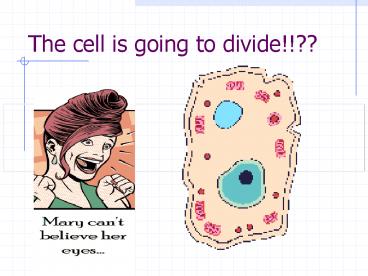The cell is going to divide!!?? - PowerPoint PPT Presentation
Title:
The cell is going to divide!!??
Description:
Title: Mitosis: the division of body cells Author: sciencelab Last modified by: mfcsd Created Date: 11/15/2001 4:38:08 PM Document presentation format – PowerPoint PPT presentation
Number of Views:35
Avg rating:3.0/5.0
Title: The cell is going to divide!!??
1
The cell is going to divide!!??
2
- www.bioweb.uncc.edu/biol1110/stages.htm
- www.biology.arizona.edu/cell_bio/tutorials/cell_cy
cle/cells1.html - science.nhmccd.edu/biol/mitosis/pmitosis.html
3
Levels of Organization
- Cell (animal or plant Body or sex
cell) - Nucleus (Contains chromosomes)
- Chromosomes (divide during cell division)
- Gene (Segment of Chromosome)
- DNA (Contains genetic
information)
4
(No Transcript)
5
Vocabulary
- Gamete sex cells sperm or egg
- Fusion of gametes forms a zygote.
- A zygote always has a full or diploid (2n) number
of chromosomes
6
- Each species has a characteristic number of
chromosomes. - Diploid (2n) number includes two sets of
chromosomes of each type. - Found in all the non-sex cells or autosomes of an
organism's body (with a few exceptions). - Examples include humans (46), crayfish (200),
etc. - Haploid (n) number contains one of each kind of
chromosome. - In the life cycle of many animals, only sperm and
egg cells(sex cells) have the haploid number. - Examples include humans (23), crayfish (100),
etc.
7
Types of Chromosomes
- Autosomes Body chromosomes or non sex
chromosomes ( humans have 44 or 22 pairs) - Sex Chromosomes XX or XY (23rd pair for humans)
determines the sex of the offspring
8
(No Transcript)
9
Mitosisthe division of body cells
Daughter cells are identical to Parent cell
Parent cell 46 chromosomes
Daughter cell 46 chromosomes
Daughter cell 46 chromosomes
10
(No Transcript)
11
Remember Cell size?
- 1cm
- If your cells
- Were this size
- Then
12
The Cell Cycle
13
THE CELL CYCLE Interphase Mitosis
Cytokinesis
14
Interphase
- Time in between cell division (mitosis)
- G1 Cell growth
- S DNA Replication
- G2 Prep for mitosis
15
Prophase
Centromeres produce spindle fibers
- 1. Chromosomes appear condensed
- 2. Nuclear envelope and nucleus disappears
- 3. Centrioles separate to the poles of the cell
- 4. Chromosome (at their centromeres)attach to
spindle fibers
16
(No Transcript)
17
Metaphase
- 1. Chromosomes line up in the equator (center) of
the cell. - (Spindle fibers help move chromosomes thru cell)
18
(No Transcript)
19
Anaphase
- 1. The centromere splits and chromatids
separate. - 2. Chromatids move to the poles of the cell
20
(No Transcript)
21
Telophase
- 1. Chromatids start to become diffuse
(chromatin) - 2. The nuclear envelope starts to reform
- 3. Nucleolus reforms
- 4. Spindle breaks apart
- 5. Cells begins splitting
22
(No Transcript)
23
Cytokinesis
- NOT a phase of mitosis
- It is a process of the cytoplasm dividing after
- mitosis.
24
(No Transcript)
25
(No Transcript)
26
Interphase
- 2 new cells are formed
- Identical to the original parent cell
27
THE CELL CYCLE Interphase Mitosis
Cytokinesis
28
Plant Mitosis
Onion Root Tip Cells
29
(No Transcript)
30
(No Transcript)
31
(No Transcript)
32
(No Transcript)
33
(No Transcript)
34
(No Transcript)
35
(No Transcript)
36
(No Transcript)
37
(No Transcript)
38
(No Transcript)
39
(No Transcript)
40
The Cell Cycle
41
Cell Division Prokaryotes
- The Prokaryotic Chromosome
- Chromosome consists of nucleoid (an
irregularly-shaped region, electron-dense, and
not enclosed by a membrane. - Chromosome, when stretched out, is a circular
loop attached to the inside of the plasma
membrane about 1,000 times the length of the
cell.
42
- 3. When cell is approximately twice its original
length, the plasma membrane grows inward, a new
cell wall forms dividing the cell into two
approximately equal daughter cells. - 4. Generation times of Escherichia coli is 20
minutes most bacteria need up to one hour to a
day.
43
(No Transcript)































